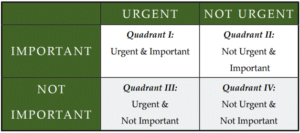Time Stealers
Sometimes, in order to discuss a problem, we need common terms – a vocabulary. The problem I would like to discuss is efficient use of time. Which activities should I engage in to meet my goals? Which activities (time stealers) should I avoid. I’ll try to start a discussion of the problem by contributing and defining a couple of applicable terms: urgent and important.
We commonly get confused by the similarity of these terms, so I’ll start by defining them (per www.mindtools.com). An activity is urgent when it demands your attention; it makes you feel that you need to deal with it now. An activity is important when it leads to meeting your goals, including your goals for and with others. The confusion arises because these two separate notions are often true about the same activity. Many activities are important and urgent, but many activities lack one or both qualities.
Let’s consider some examples: a ringing phone or a crying baby are both urgent. They demand our attention. But are they important? It is hard to tell without more information. The ringing phone may be your spouse calling to tell you that the car is broken down (important), or it may be a salesperson trying to talk to you about a “special deal” on a cruise package (not important). The crying baby may be your child who has fallen down and skinned her knee (important), or it may be someone else’s child being fussy about too much time at the mall (not important).
In this sense, we can think about activities in a matrix as follows:

(Stephen Covey: The 7 Habits of Highly Effective People, via http://www.usgs.gov/humancapital/documents/TimeManagementGrid.pdf)
For our purposes, time stealers are those activities in the bottom half of the matrix.
I hope you can think more clearly about the activities you engage using these definitions. You’re probably thinking “Great, now all I have to do is figure out what is important. How would I do that?” Stay tuned, this thinking has broad implications on how we plan and best utilize our time. In the near term, I will post in more detail on how to manage time based on these definitions, including how to identify important information and tasks.

2 comments